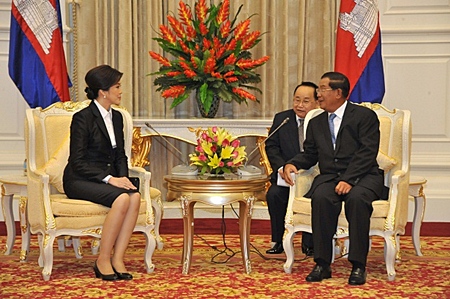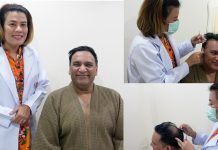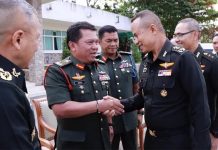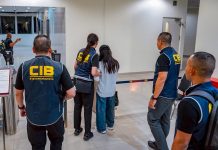PHNOM PENH, Sept 16 — Thailand and Cambodia agreed to revive bilateral relations to benefit the people of both nations after their ties soured due to border conflicts and tensions resulting in many military clashes.
Attempts to revitalise bilateral ties marked yesterday’s official visit to Cambodia by Thai Prime Minisiter Yingluck Shinawatra, her first to the Cambodia kingdom since assuming office.

After the official welcoming ceremony at the Office of the Prime Minister of Cambodia, the Peace Palace, Ms Yingluck met for bilateral talks with her Cambodian counterpart Hun Sen.
The visit was considered by the Thai and Cambodian governments as opening a new era of Thai-Cambodia relations to develop closer relations between the people of the two nations.
Both sides agreed that they would not let any problems affect relations and would apply peaceful approaches to resolving problems which may occur in the future.
Existing mechanisms including the Joint Commission for Cooperation (JC), Joint Border Commission (JBC), General Border Committee (GBC) and Regional Border Committee (RBC) would be used to find peaceful solutions.
They will promote communication between their officials at all levels.
Thailand and Cambodia agreed to follow the World Court’s order and use the GBC to consider details in implementing the Court’s order.
The International Court of Justice (World Court) on July 18 ordered Thailand and Cambodia to withdraw their troops from the newly defined demilitarised zone in a disputed portion of their border around the ancient Preah Vihear temple. The World Court urged both countries to work with the Association of Southeast Asian Nations (ASEAN) to agree to allow the bloc’s observers to enter the disputed zone.
The Thai and Cambodia leaders also discussed the maritime seabed claims. Ms Yingluck and Mr Hun Sen agreed to further talks after their being suspended for a long time.
Ms Yingluck had told Mr Hun Sen that according to the Thai Constitution a draft framework must be approved by Parliament before officially beginning talks.
As for economic cooperation, existing mechanisms such as the Joint Commission (JC) and the Joint Trade Commission (JTC) would be used to expand trade and investment, particularly along the border for a better quality of life for residents on both sides of the border.
The Thai premier expressed readiness to support the development plan for infrastructure in Cambodia including the communication network. Both leaders agreed to open a new permanent check-point in Aranyaprathet district of Sa Kaeo.
The discussion also touched on regional tourism promotion, technical cooperation and scholarships.
Ms Yingluck also asked about options to help the two Thai activists jailed in a Cambodian prison on espionage charges. In response, Mr Hun Sen pledged to work out commuting the jail terms of the two Thai activists before seeking royal pardon.
A Cambodian court on Feb 1 ruled that Mr Veera Somkwamkid, a key network activist and his secretary Ratree Pipattanapaiboon were guilty of espionage, illegal entry, and trespassing in a military zone. Mr Veera was sentenced to an eight-year jail term and a1.8 million riel (US$450) fine while Ms Ratree was handed down a six-year jail term and a 1.2 million riel ($300) fine.
The Cambodian trip was the premier’s third to an ASEAN country since taking office, to introduce herself to regional leaders. She earlier visited Brunei and Indonesia and was scheduled to visit the Lao on Friday.




